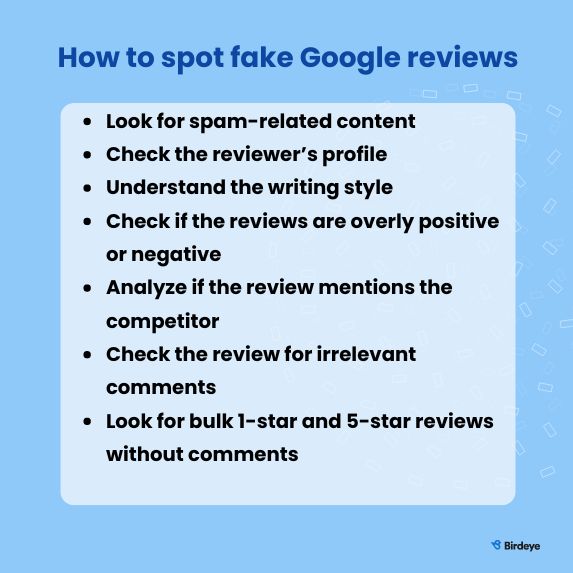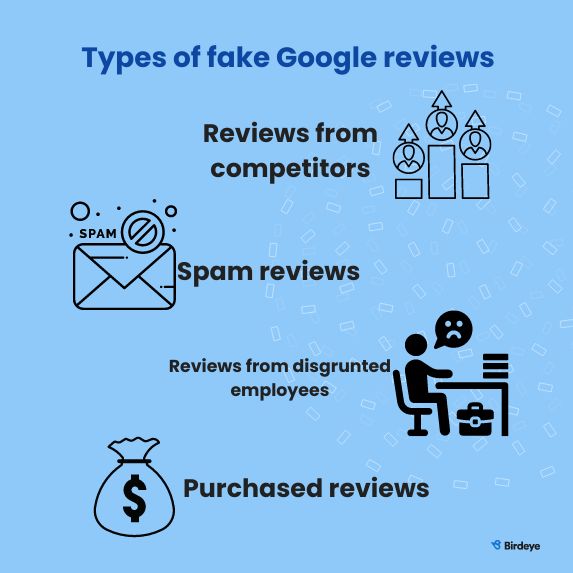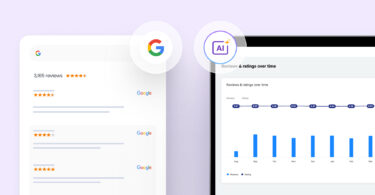Many healthcare brands rely on Google reviews to strengthen their online presence. A Birdeye study of biggest global brands has revealed that Google dominates the healthcare review landscape, capturing 94% of all reviews.
So, managing your Google Business Profile (GBP) to protect your online reputation is imperative to attract new patients.
Unfortunately, fake reviews can hinder your ability to use Google as an effective lead-generation tool. To combat this, this blog will help you handle fake Google reviews and take proactive steps to minimize their impact on your brand.
Table of contents
- Why should doctors handle fake Google reviews?
- How to spot fake Google reviews?
- Understanding different types of fake reviews on Google
- How do you handle fake Google reviews?
- Why shouldn’t businesses buy fake Google reviews?
- Generating more Google reviews to combat fake reviews
- Frequently asked questions about fake Google reviews
- Streamline review management with Birdeye
What are fake Google reviews? Fake Google reviews are fabricated or manipulated reviews that do not accurately reflect a customer's genuine experience with a business. They can be positive or negative, but are often used to manipulate a business's online reputation.
Why should doctors handle fake Google reviews?
If your healthcare brand handles more than one location, a few fake Google reviews do not feel like a problem. But the impact piles and fake Google reviews can impact doctors and the overall business significantly.
Fake Google reviews can hamper doctors and other healthcare professionals in multiple ways:
Disrupt online reputation management for doctors
Even a few fake Google reviews can hurt your online reputation. Google keeps changing the order of reviews, so it’s hard to know which ones potential patients will see. Unfortunately, these fake reviews might be the only ones patients notice, which could discourage them from choosing your services.
A successful doctor’s reputation management determines the trust patients have in them. Fake Google reviews can be a devastating blow to their practice.
Impact local search ranking
Good or bad, reviews affect how easily people can find you online. To be one of the top three choices on Google, you need a high rating on Google Local Pack (also known as 3-pack, snack pack, or Google 3).
On the other hand, just a few bad fake reviews can lower your average rating, making your clinic or hospital less visible on Google.
Reduce bookings from Google
Google reviews make up about 80% of all online reviews, and they’re crucial for patients when deciding on a service. In healthcare, Google reviews account for a whopping 94% of all online reviews. However, when fake reviews flood this platform, it becomes harder for businesses to attract leads through Google. They might have to turn to other paid channels instead.
Pro-tip: Check out these 8 local SEO landing page tips you need to implement to attract more patients.
Generate authentic Google reviews from genuine customers with Birdeye
Want to see the impact of Birdeye on your business? Watch the Free Demo Now.
How to spot fake Google reviews?
Here are a few handy tips for businesses and customers to distinguish fake reviews from the genuine ones:

- Look for spam-related content
- Check the reviewer’s profile
- Understand the writing style
- Check if the reviews are overly positive or negative
- Analyze if the review mentions the competitor
- Check the review for irrelevant comments
- Look for bulk 1-star and 5-star reviews without comments
Let’s explore these aspects in detail.
Look for spam-related content
Businesses often receive fake reviews on their Google Business Profile, typically from spam agencies and bots pushing irrelevant products or services. You can usually spot these bogus reviews by the presence of unnecessary links or repetitive, unrelated content.
Check the reviewer’s history
Click on the reviewer’s profile to see if they have reviewed other businesses or just yours. Usually, people create fake profiles to spam, sabotage, or leave fake negative reviews on businesses. They do this by using unique profiles for each review to not leave a trail behind.
Understand the writing style
The way a review is written tells you a lot. Real customers usually write in a straightforward, relatable style. You won’t typically see industry jargon or a salesy vibe in a genuine review. On the flip side, fake reviews often have a polished, marketing-like flair, with fancy terms and a pushy tone.
Check if the reviews are overly negative or positive
Most customers who write genuine reviews tend to stay neutral, even in negative or positive situations. Any review that is overly bashing the business or outright promoting it without any factual evidence is more likely to be a paid review, aka a fake Google review.
Analyze if the reviews mention the competitor
You can also analyze your reviews to spot competitor names and other competitor-related keywords. Any review that overly bashes the business while promoting the direct competitor could be a fake one.
Check the review for irrelevant comments
You might notice reviews mentioning irrelevant products or services that don’t align with the business. While these could occasionally be genuine errors, they are more likely to be fake reviews.
Competitors or paid fake review services might flood your business profile with numerous irrelevant reviews to significantly lower your average rating.
Look for bulk 1-star and 5-star reviews without comments
If the business profile has too many 1-star or 5-star ratings without any comments posted around the same time, they are more likely to be fake. You can check the timestamp of these reviews to see if they are genuine.
FTC landmark judgment bans fake reviews and celebrity testimonials On August 14, 2024, the Federal Trade Commission (FTC) took a significant step to combat the growing prevalence of fake reviews and testimonials online. Key provisions of the rule: • Fake reviews and customer testimonials: Prohibits businesses from creating, selling, or buying fake reviews, including AI-generated ones or those written by people without experience. • Incentivized reviews: Bans businesses from offering incentives for reviews with a particular sentiment. • Insider reviews: Prohibits businesses from disseminating reviews written by company insiders or their relatives without clear disclosure. • Review websites: Prevents businesses from misrepresenting the independence of review websites they control. • Review suppression: Prohibits businesses from using threats or intimidation to suppress negative reviews and requires transparency about review gating practices. • Fake social media indicators: This law prohibits selling or purchasing fake social media indicators that misrepresent a person's influence.
Understanding different types of fake reviews on Google
Here are the different types of fake Google reviews you need to know to streamline your online reputation:

- Spam reviews: These are false or irrelevant reviews left on your Google Business Profile by a competitor, bot, or fake account. These usually come in bulk and comment with unrelated links or content on your profile.
- Reviews by competitors: Some businesses try to look better online by leaving bad reviews for their rivals. If your clinic gets a lot of bad reviews that talk about another clinic and they’re from people you don’t know, your rival might be behind them.
- Reviews from disgruntled employees: Often, businesses get fake reviews from disgruntled employees, partners, and vendors who wish to harm their online reputation.
- Purchased reviews: Even though Google doesn’t allow purchased reviews, some businesses still buy them to boost their ratings. These reviews often lack real content and just use basic language.
Did you know: A Seattle-based plastic surgeon, Dr. Javad Sajan, and his clinic, Allure Esthetic, was penalized with $5 million for review manipulation. To make his brand look perfect and achieve a 5-star reputation, he: ‣ Created fake profiles to post positive reviews ‣ Pressurized the patients to remove negative reviews ‣ Threatened them with illegal NDAs ‣ Offered incentives for leaving positive reviews Birdeye is against such malpractices and alerts other businesses to follow the ethics of running a business honestly.
How do you handle fake Google reviews?
You may also want to investigate whether the review infringes upon Google’s content policies.
Businesses and customers can report fake reviews on Google and request the platform to remove them. However, Google is the largest search engine in the world, and it may take longer than expected for you to get a response from them.
In such cases, businesses can:
- Respond to the Google review tactfully
- Report/flag a Google review
- Approach Google via customer support channels
- Wait for Google’s algorithm to detect it as spam
Let’s discuss these options in detail:
Respond to the review tactfully
While getting too many fake reviews is stressful, presenting a professional face online is essential. Ensure that your business does not suffer in the process of calling out the fake review.
Depending on the nature of the fake review, you can take two routes:
The “Contact Us” approach
If you are unsure if this is your patient, leave a professional apology and a request for the reviewer to either share their contact details or contact the doctor’s office directly. If they contact you, take steps to rectify the issue and request them to edit the review.
If you don’t receive a response, you can also edit the previous response to state that this seems to be a fake review as you cannot locate the patient in your database.
The “Not a Patient” approach
If the fake review is entirely irrelevant, influenced by a competitor or a disgruntled employee, you can directly call them out via your response.
Once you have verified that this is not a patient, please respond that this is a fake review, as the reviewer has not availed of your services.
Report fake Google reviews
The buck doesn’t stop with responding to the fake review. Google may still index the review and impact your online reputation. So, it is essential that your business reports the review in question to Google.
How to report fake Google reviews?
You can report a fake Google review with the following steps:
- Login to your Google account.
- Access your Google Business Profile dashboard.
- Move to the “Reviews” tab.
- Locate the fake review.
- Click on the three dots on the right-hand side of the review.
- Choose “Report review” from the menu.
- On the next screen, choose the appropriate reason for reporting the review.
- Click “Confirm.
Also Read: Can I remove a Google Review?
Wait for the review to be removed
The catch here is that it usually takes Google a few days or even a week to examine your report and conclude if the review is genuine. If it decides it’s genuine, it’ll leave it posted. In case it’s a fake review, it may withdraw it, or put it on hold.
If Google puts a hold on a fake review, the review is hidden from everyone except the person who has posted it. The reviewer will be notified that their review was reported as false, and the reason provided.
While you’re waiting, you can leave a comment that you have reported this review and try to sink the negative reviews by generating more reviews from genuine customers.
Get in touch with Google directly
If you don’t hear from Google within a few weeks, you can approach Google directly to plead your case.
You can contact Google customer support via the Workspace app, email, phone, or the Google help community. If your profile is affected by too many fake reviews, it is best to contact them immediately and have it resolved.
Read our detailed guide to know more about the ways to connect with Google customer support.
Take the legal route
Calling an attorney may be your last resort if none of the above options work. Google seriously considers legal requests and processes them quickly. However, you must have a legitimate case.
Ensure that the review is genuinely fake, and it is possible to prove this. Use this route cautiously. Google does not encourage an overuse of this recourse.
Why shouldn’t businesses buy fake Google reviews?
Buying Google reviews to boost your online reputation is a short-term and short-lived decision. It is against Google’s policy and may also invite large fines from the FTC.
Google’s algorithm can detect spam reviews using machine learning technologies. If the platform understands that the patient experience differs from those mentioned in the review, you may face harsh penalties.
Birdeye studies show that customers read multiple reviews before picking a healthcare business. So, they are not just seeing the average ratings but carefully reading the content of Google reviews to understand more about the patient experience.
Buying fake reviews means getting lackluster reviews that don’t connect with your audience and fail to convert them into leads.
Generating more Google reviews to combat fake reviews
Reporting fake reviews and getting them removed is a long-drawn process. However, you can quickly minimize the impact of those reviews by generating genuine reviews from your existing customers.
We understand that running a practice and focusing on online reputation management can be daunting. But it is an essential piece of the puzzle. Doctors and other healthcare practitioners can significantly improve their online reputation and quickly scale their practice by investing in review generation.
If the administrative process is proving to be a challenge, work with a HIPAA-compliant review management tool like Birdeye to:
- Automate review requests by integrating the tool with your patient management system
- Monitor all online reviews from a single dashboard
- Receive instant notifications on potential spam or fake reviews
- Flag, report, and respond to reviews from a centralized dashboard
- Share positive reviews on social media channels to boost online reputation
Frequently asked questions about fake Google reviews
Yes, according to the Federal Trade Commission, all fake reviews, including fake Google reviews, are illegal and subject to hefty fines.
Fake reviews contain spam links, ambiguous language, and irrelevant comments, and they often just have a rating without any description of the experience.
The best way to deal with fake 1-star reviews is to respond to the review, stating that the reviewer hasn’t used your services, and report the review to Google for removal.
If you believe you have found a fake Google review, you can report it to Google. You may also want to respond to the review, explaining why you believe it is fake and providing evidence to support your claim.
In some cases, it may be possible to sue someone for defamation if they have left a fake Google review that is damaging to your business. However, consulting with an attorney to discuss your situation is important.
Streamline review management with Birdeye
Spotting and reporting fake Google reviews is not a one-and-done job, not to mention the work that entails doing this across other niche-specific review platforms. That is why investing in a review management platform like Birdeye can help you get ahead of the game.
The faster you spot fake reviews, the sooner you can report them and safeguard your online reputation. With Birdeye, you can instantly check reviews across all sites from a centralized dashboard. You can also automate review generation to counter the ill effects of fake reviews.
Transform how your business handles reviews with Birdeye today!

Originally published









